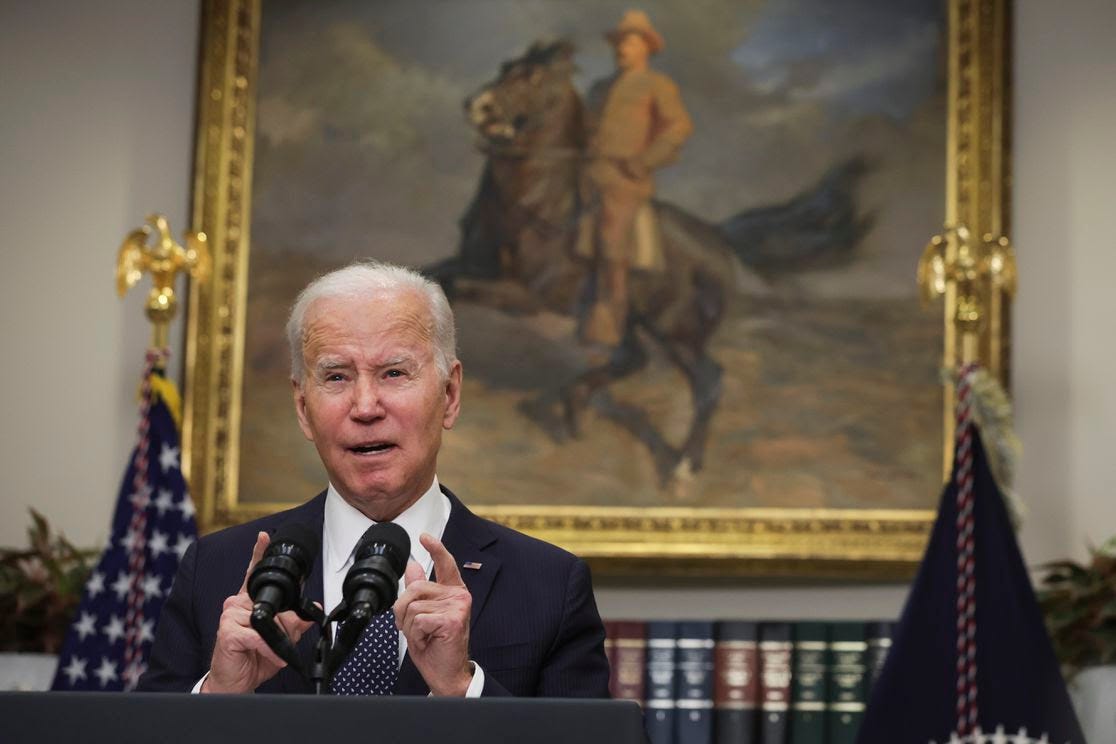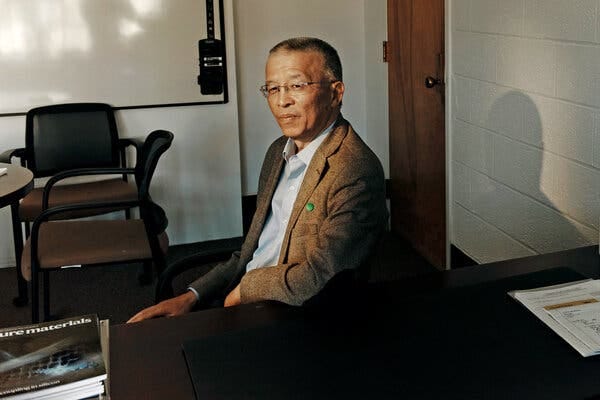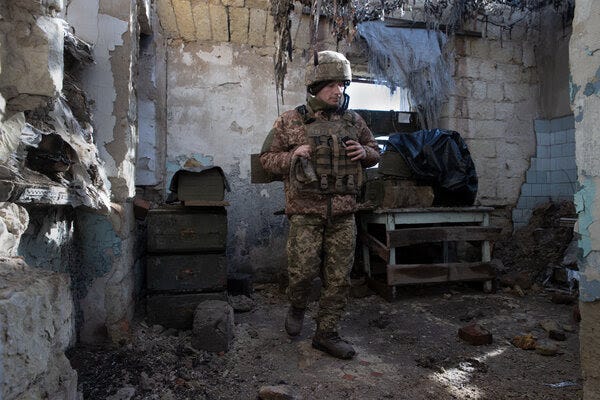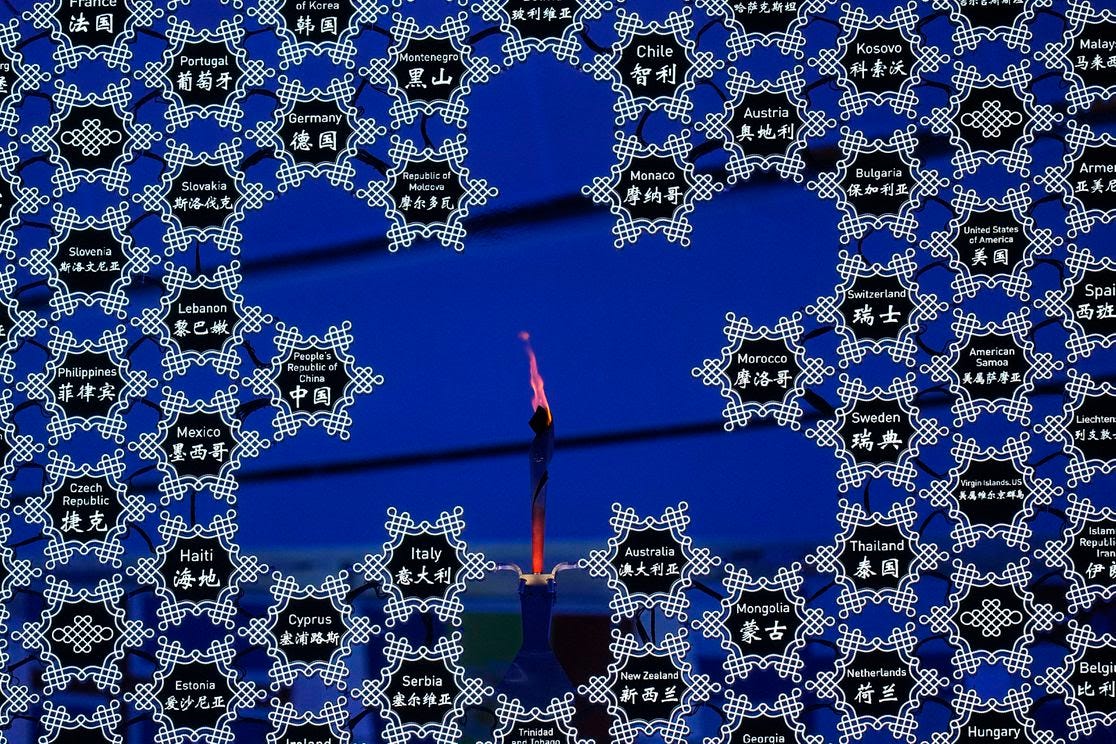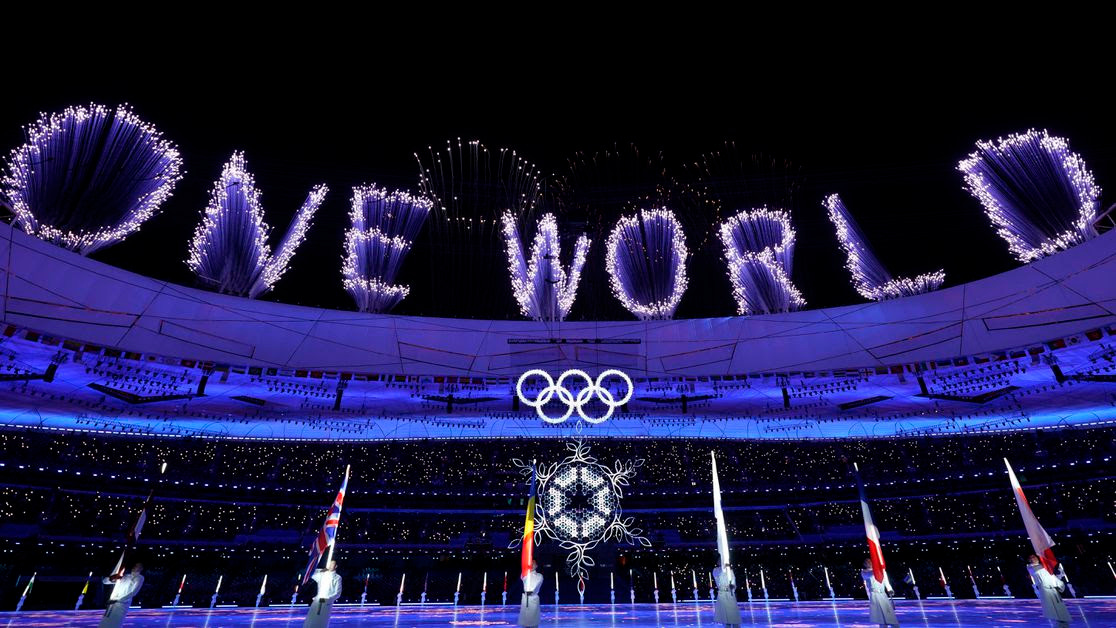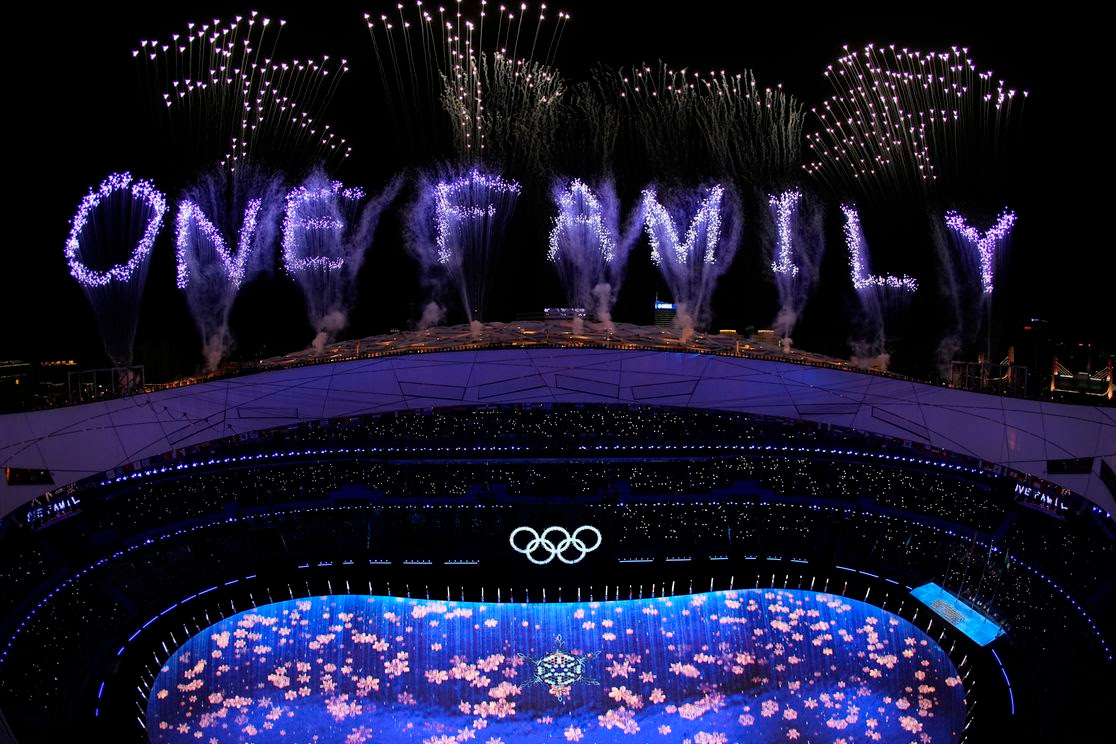The Full Belmonte, 2/21/2022
“MOSCOW (AP) — The U.S. and Russian presidents have tentatively agreed to meet in a last-ditch diplomatic effort to stave off Moscow’s invasion of Ukraine as heavy shelling continued Monday in a conflict in eastern Ukraine that is feared will spark the Russian offensive.
French President Emmanuel Macron sought to broker a possible meeting between U.S. President Joe Biden and Russian President Vladimir Putin in a series of phone calls that dragged into the night.
Macron’s office said both leaders had ‘accepted the principle of such a summit,’ to be followed by a broader summit meeting also involving other ‘relevant stakeholders to discuss security and strategic stability in Europe.’ It added that the meetings ‘can only be held on the condition that Russia does not invade Ukraine.’
White House press secretary Jen Psaki, said the administration has been clear that ‘we are committed to pursuing diplomacy until the moment an invasion begins.’ She noted that ‘currently, Russia appears to be continuing preparations for a full-scale assault on Ukraine very soon.’” Read more at AP News
“Never in the history of warfare have two sides offered a real-time, play-by-play deconstruction of movements toward imminent war, Axios World author Dave Lawler writes.
Why it matters: President Biden and Vladamir Putin are playing public mind games to shape the narrative and get inside the heads of a global audience — and each other — to gain the upper hand in an information war as a possible prelude to a real one.
President Biden speaks about Ukraine in the Roosevelt Room on Thursday. Photo: Alex Wong/Getty Images
The White House has taken a lesson from Afghanistan, when officials failed to prepare Americans for the swift Taliban takeover.
So U.S. officials are trying to announce Putin's plays before he runs them — a novel and risky strategy they hope might stave off an invasion, or at least help unify the international community against it.
Biden said Friday: "We’re calling out Russia’s plans loudly and repeatedly, not because we want a conflict, but ... to remove any reason that Russia may give to justify invading Ukraine."
U.S. officials have been releasing intelligence for weeks about alleged Russian plans to build a pretext for war. Secretary of State Tony Blinken took that to a new level Wednesday by providing a step-by-step description of how the U.S. expects an invasion to unfold.
Blinken said today on NBC's "Meet the Press": "It certainly looks like everything we said was likely to occur in the lead-up to the actual invasion is happening." (Video)
Putin chairs a video-conference Security Council meeting Friday at his Novo-Ogaryovo residence outside Moscow. Photo: Mikhail Klimentyev, Sputnik, Kremlin Pool Photo via AP
Between the lines: Russia has appeared to follow the playbook Blinken laid out.
Reports on Friday that a separatist police chief's car was bombedchimed with Blinken's warning that Russia would fabricate "terrorist attacks" and blame Ukraine.
All of this came after a remarkable head fake from Putin earlier in the week. In televised meetings with top officials, he announced Russia would pull troops back from the border and focus on diplomacy. U.S. officials say that didn't happen.
Inside the strategy: If Putin's media strategy is to sow confusion, Biden's is to speak with an almost jarring clarity about what he expects.
The Biden administration has flooded the airwaves. State Department officials did 16 interviews last Tuesday alone in U.S., Ukrainian and European media.
Biden made two televised addresses in four days, and used the first to prepare Americans for higher energy prices in the event of war.
Putin claims the U.S. is trying to bait him into invading.” Read more at Axios
“Average daily COVID-19 cases and hospitalizations are continuing to fall in the U.S., an indicator that the omicron variant’s hold is weakening across the country.
Total confirmed cases reported Saturday barely exceeded 100,000, a sharp downturn from around 800,850 five weeks ago on Jan. 16, according to Johns Hopkins University data.
In New York, the number of cases went down by more than 50% over the last two weeks.
‘I think what’s influencing the decline, of course, is that omicron is starting to run out of people to infect,’ said Dr. Thomas Russo, professor and infectious disease chief at the University of Buffalo’s Jacobs School of Medicine and Biomedical Sciences.
COVID-19 hospitalizations are down from a national seven-day average of 146,534 on Jan. 20 to 80,185 the week ending in Feb 13, according to the Centers for Disease Control and Prevention COVID data tracker.” Read more at AP News
“WASHINGTON — The Justice Department will soon announce changes to the China Initiative, a Trump-era effort to combat Chinese national security threats, after civil rights proponents, business groups and universities told the Biden administration that the program had fostered suspicion of Asian professors working in the United States, chilled scientific research and contributed to a rising tide of anti-Asian sentiment, according to people briefed on the matter.
The likely changes, including retiring the China Initiative name, are the result of a three-month evaluation undertaken by Matthew G. Olsen, the head of the Justice Department’s national security division.
The modifications to a program that brought espionage, trade-secrets theft and cybercrime cases under a single banner comes as Beijing continues to use spies, cyberhacking, theft and propaganda to challenge America’s standing as the world’s pre-eminent economic and military power — activity that has only grown more acute.
The F.B.I. has more than 2,000 open investigations into Chinese efforts to steal American information and technology, and it is opening new cases related to Chinese intelligence operations about every 12 hours, Christopher A. Wray, the bureau’s director, said last month. ‘There is just no country that presents a broader threat to our ideas, our innovation and our economic security than China,’ he said.
Republicans have argued that changing the program would indicate that the Biden administration was going soft on Beijing. But Mr. Olsen has told the leaders of the Senate Intelligence Committee and White House officials that the department’s work will not be hampered.
The modifications will most likely focus on the department’s efforts to root out academics and researchers who lied to the government about Chinese affiliations, according to the people briefed on the matter, who spoke on the condition of anonymity because they were not authorized to disclose private conversations about the forthcoming changes. Such prosecutions were meant to deter people from hiding foreign affiliations, as national security officials worry that researchers who hide foreign government ties can be more easily groomed to share valuable information.
In a notable setback for the Justice Department’s China Initiative, prosecutors last month dropped charges against Gang Chen, an M.I.T. professor.Credit...Tony Luong for The New York Times
But critics say that prioritizing such cases as part of a program to combat serious national security threats incentivizes investigators to unfairly target Asian professors and lumps financial disclosure cases with more serious crimes, like espionage and trade-secret theft, wrongly giving the impression that everyone who hid Chinese affiliations was a spy.
While the China Initiative has resulted in numerous pleas and convictions, several cases against academics have ended in acquittal or dismissal. In one high-profile failure, prosecutors withdrew charges against Gang Chen, a mechanical engineering professor at M.I.T., after the Energy Department said that his undisclosed affiliations with China would not have affected his grant application.” Read more at New York Times
“PORTLAND, Ore. — A deadly weekend shooting in Portland at a protest against police killings left one person dead and five others wounded, raising tensions once again among the city’s social justice activists.
The Portland Police Bureau said a woman was dead when officers arrived on Saturday night at the scene in the neighborhood of Rose City Park. Two men and three other women were taken to a nearby hospital, the police said.
The shooting, which occurred at the start of a protest, appeared to be ‘a confrontation between armed protesters and an armed homeowner,’ Lt. Nathan Sheppard said by phone on Sunday. ‘That’s what the preliminary investigation is indicating.’
He declined to provide details about the people hospitalized and declined to say whether anyone was in custody.” Read more at New York Times
“Since the summer, a black bear known as Hank the Tank has made a 500-pound nuisance of himself in South Lake Tahoe, Calif., breaking into more than two dozen homes to rummage for food and leaving a trail of damage behind.
So far, nobody has been able to deter Hank, said Peter Tira, a spokesman for the California Department of Fish and Wildlife. Department officials and the local police have tried to ‘haze’ the bear with paintballs, bean bags, sirens and Tasers, but he is too drawn to humans and their food to stay away for long.
‘It’s easier to find leftover pizza than to go in the forest,’ Mr. Tira said on Sunday.
Residents have called the police about Hank more than 100 times since July as he continues to rampage through Tahoe Keys, a gated community about 190 miles northeast of San Francisco.
Now the authorities are trying to trap Hank and possibly euthanize him.
‘This is a bear that has lost all fear of people,’ Mr. Tira said. ‘It’s a potentially dangerous situation.’
Hank, so named by local residents, has used his size and strength to barge through garages, windows and door. As of Thursday, Hank had broken into at least 28 homes.
At 500 pounds, Hank is ‘exceptionally large,’ the state wildlife authorities said. The average black bear in the western United States weighs 100 to 300 pounds, according to the Washington Department of Fish and Wildlife.
But Hank’s diet of human food and garbage has expanded his size, said Ann Bryant, the executive director of the Bear League, a wildlife rescue service in Homewood, Calif.
‘He didn’t get fat like that eating berries and grubs,’ she said, adding that it was not clear how Hank developed a taste for human food.
Hank became one of the neighborhood’s least-wanted residents in July, which is around the time that bears enter hyperphagia, a period when they bulk up on calories before they hibernate for the winter, according to the National Park Service.” Read more at New York Times
“The value-store chain Family Dollar said on Saturday that it had temporarily closed more than 400 stores after the discovery of a rodent infestation and other unsanitary conditions at a distribution center in Arkansas touched off a far-reaching recall of food, dietary supplements, cosmetics and other products.
A recent Food and Drug Administration inspection of the facility, in West Memphis, Ark., found live and dead rodents ‘in various states of decay,’ rodent droppings, evidence of gnawing and nesting, and products stored in conditions that did not protect against these unsanitary conditions, the agency said in a statement on Friday.
A fumigation of the facility last month revealed more than 1,100 dead rodents, and a review of company records indicated the collection of more than 2,300 rodents from late March to September, ‘demonstrating a history of infestation,’ the agency said. Rodent contamination can cause salmonella and infectious diseases, the F.D.A. said.
Families rely on stores like Family Dollar for food, medicine and other products, and those items should be safe, Judith McMeekin, an associate commissioner in the agency’s Office of Regulatory Affairs, said in the statement.” Read more at New York Times
“Canadian crackdown | Police said they had largely cleared downtown Ottawa of the anti-vaccine protests that have roiled Canada and its capital for three weeks, as a financial crackdown on demonstrators widened. Law enforcement officials made 191 arrests, froze 206 bank accounts and determined the virtual addresses of 253 Bitcoin associated with the movement.” Read more at Bloomberg
“Ethiopia began generating electricity from its giant dam on a Nile tributary, a project it sees as key to its economic development but that’s stirred tensions with downstream neighbors.” Read more at Bloomberg
“The client rosters of Swiss banks are among the world’s most closely guarded secrets, protecting the identities of some of the planet’s richest people and clues into how they accumulated their fortunes.
Now, an extraordinary leak of data from Credit Suisse, one of the world’s most iconic banks, is exposing how the bank held hundreds of millions of dollars for heads of state, intelligence officials, sanctioned businessmen and human rights abusers, among many others.
A self-described whistle-blower leaked data on more than 18,000 bank accounts, collectively holding more than $100 billion, to the German newspaper Süddeutsche Zeitung. The newspaper shared the data with a nonprofit journalism group, the Organized Crime and Corruption Reporting Project, and 46 other news organizations around the world, including The New York Times.
The data covers accounts that were open from the 1940s until well into the 2010s but not the bank’s current operations.
Among the people listed as holding amounts worth millions of dollars in Credit Suisse accounts were King Abdullah II of Jordan and the two sons of the former Egyptian strongman Hosni Mubarak. Other account holders included sons of a Pakistani intelligence chief who helped funnel billions of dollars from the United States and other countries to the mujahedeen in Afghanistan in the 1980s and Venezuelan officials ensnared in a long-running corruption scandal.
The leak shows that Credit Suisse opened accounts for and continued to serve not only the ultrawealthy but also people whose problematic backgrounds would have been obvious to anyone who ran their names through a search engine.
Swiss banks have long faced legal prohibitions on taking money linked to criminal activity, said Daniel Thelesklaf, the former head of Switzerland’s anti-money laundering agency. But, he said, the law generally hasn’t been enforced.
Candice Sun, a spokeswoman for the bank, said in a statement that ‘Credit Suisse strongly rejects the allegations and inferences about the bank’s purported business practices.’ She said many of the accounts in the leak date back decades to ‘a time where laws, practices and expectations of financial institutions were very different from where they are now.’” Read more at New York Times
A Ukrainian Army soldier in eastern Ukraine.Tyler Hicks/The New York Times
A new era?
“There have been dozens of wars in the almost 80 years since World War II ended. But if Russia invades Ukraine in the coming days, it will be different from almost all of them. It will be another sign that the world may be entering an alarming new era in which authoritarianism is on the rise.
In today’s newsletter, I’ll explain the two main ways that a war in Ukraine would be distinct. I will also update you on the latest developments, with reporting from my colleagues around the world.
1. Regional dominance
A Russian invasion of Ukraine seems likely to involve one of the world’s largest militaries launching an unprovoked ground invasion of a neighboring country. The apparent goal would be an expansion of regional dominance, either through annexation or the establishment of a puppet government.
Few other conflicts since World War II fit this description. Some of the closest analogies are the Soviet Union’s invasion of Afghanistan in the 1970s, Czechoslovakia in the 1960s and Hungary in the 1950s — as well as Vladimir Putin’s 2014 annexation of Crimea. The U.S., for its part, invaded Panama in the 1980s and used the C.I.A. to overthrow an elected government in Guatemala in the 1950s. Of course, it also launched several faraway wars, in Iraq, Vietnam and elsewhere.
But the world’s most powerful counties have rarely used force to expand their boundaries or set up client states in their region. Instead, they have generally abided by the treaties and international rules established in the 1940s. The phrase ‘Pax Americana’ describes this stability.
The relative peace has had enormous benefits. Living standards have surged, with people living longer, healthier and more comfortable lives on average than their ancestors. In recent decades, the largest gains have come in lower-income countries. The decline in warfare has played a central role: By the start of this century, the rate at which people were dying in armed conflicts had fallen to the lowest level in recorded history, as Joshua Goldstein, Steven Pinker and other scholars have noted.
A Russian invasion of Ukraine would look like the kind of war that has been largely absent in the past 80 years and that was once common. It would involve a powerful nation setting out to expand its regional dominance by taking over a neighbor. A war like this — a voluntary war of aggression — would be a sign that Putin believed that Pax Americana was over and that the U.S., the European Union and their allies had become too weak to exact painful consequences.
As Anne Applebaum has written in The Atlantic, Putin and his inner circle are part of a new breed of autocrats, along with the rulers of China, Iran and Venezuela: ‘people who aren’t interested in treaties and documents, people who only respect hard power.’
This is why many people in Taiwan find the situation in Ukraine to be chilling, as my colleagues Steven Lee Myers and Amy Qin have explained. ‘If the Western powers fail to respond to Russia, they do embolden the Chinese thinking regarding action on Taiwan,’ said Lai I-chung, a Taiwanese official with ties to its leaders. If the world is entering an era in which countries again make decisions based, above all, on what their military power allows them to do, it would be a big change.
2. Democratic recession
Political scientists have been warning for several years that democracy is in decline around the world. Larry Diamond of Stanford University has described the trend as a ‘democratic recession.’
Freedom House, which tracks every country in the world, reports that global political freedom has declined every year since 2006. Last year, Freedom House concluded, ‘the countries experiencing deterioration outnumbered those with improvements by the largest margin recorded since the negative trend began.’
A Russian takeover of Ukraine would contribute to this democratic recession in a new way: An autocracy would be taking over a democracy by force.
Ukraine is a largely democratic nation of more than 40 million people, with a pro-Western president, Volodymyr Zelensky, who in 2019 won 73 percent of the vote in the election’s final round. That victory and recent polls both indicate that most Ukrainians want to live in a country that resembles the European nations to its west — and the U.S. — more than it resembles Russia.
But Putin and his inner circle believe that liberal democracies are in decline, a view that Xi Jinping and other top Chinese officials share.
They know that the U.S. and Europe are now struggling to lift living standards for much of their populations. Putin and Xi also know that many Western countries are polarized, rived by cultural conflicts between metropolitan areas and more rural ones. Major political parties are weak (as in the case of the old center-left parties in Britain, France and elsewhere) or themselves behaving in anti-democratic ways (as with the Republican Party in the U.S.).
These problems have given Putin and his top aides confidence to act aggressively, believing that ‘the American-led order is in deep crisis,’ Alexander Gabuev of the Carnegie Moscow Center wrote in The Economist this weekend.
In the view of Putin’s regime, Gabuev explained: ‘A new multipolar order is taking shape that reflects an unstoppable shift in power to authoritarian regimes that support traditional values. A feisty, resurgent Russia is a pioneering force behind the arrival of this new order, along with a rising China.’
As I’ve tried to emphasize before, the situation in Ukraine remains highly uncertain. Putin may still choose not to invade, given the potential for a protracted war, a large number of Russian casualties and economic turmoil. An invasion would be a spectacular gamble with almost no modern equivalent — which is also why it would be a sign that the world might be changing.
Related: ‘The 21st century has become a dark century because the seedbeds of democracy have been neglected and normal historical authoritarianism is on the march,’ David Brooks wrote in a recent Times column.
And Farah Stockman argues that the Russia-China friendship that Richard Nixon feared has arrived.
New developments
As a Russian invasion of Ukraine appears more and more likely, Western leaders are discussing how to respond to different scenarios.
France says President Biden and Putin have agreed to ‘the principle’ of a summit if there’s no invasion.
The U.S. said it had ‘credible information’ that Russia had compiled a list of Ukrainians to kill or detain in the aftermath of an invasion.
The West warns that Moscow could use two small enclaves in Ukraine to spark war.” Read more at New York Times
“Tightening curbs | Hong Kong is considering stricter social-distancing measures and preparing for a universal testing push to curtail an escalating virus outbreak that’s straining its health infrastructure. The city reported 7,533 new cases today, as well as 13 deaths that included an 11-month-old girl.” Read more at Bloomberg
“Lifting restrictions | Boris Johnson is set to announce an end to England’s Covid-19 regulations today, a day after the U.K.’s 95-year-old monarch, Queen Elizabeth II, tested positive. The prime minister is keen to present some good news to a public weary of restrictions after the U.K. has suffered more than 161,000 coronavirus deaths.” Read more at Bloomberg
“When Fosen Vind built dozens of towering wind turbines on the land of Norway’s Indigenous Sami, the reindeer left, spooked by the construction and the whoosh of spinning blades. The turbines, vital to the oil-dependent nation’s switch to green energy, threatened a core part of the Sami’s culture and economy and, according to the country’s highest court, violated their human rights. But they remain standing, in what is being cast as a test case for wind power’s future in Norway.” Read more at Bloomberg
A reindeer roaming around the wind turbines at Storheia wind farm.
Photographer: Heiko Junge/AFP/Getty Images
“CANBERRA, Australia (AP) — International tourists and business travelers began arriving in Australia with few restrictions on Monday, bringing together families in tearful reunions after separations of two years or longer forced by some of the most draconian pandemic measures of any democracy in the world.
Australia closed its borders to tourists in March 2020 in a bid to reduce the local spread of COVID-19, but on Monday removed its final travel restrictions for fully vaccinated passengers.
Tearful British tourist Sue Witton hugged her adult son Simon Witton when he greeted her at Melbourne’s airport.
‘Seven hundred and twenty-four (days) apart and he’s my only son, and I’m alone, so this means the world to me,’ she told reporters.
Travelers were greeted at Sydney’s airport by jubilant well-wishers waving toy koalas and favorite Australian foods including Tim Tams chocolate cookies and jars of Vegemite spread.” Read more at AP News
“Not sharing | Last month, former U.S. President Donald Trump’s political action committee Save America didn’t donate any of the $108 million it had in the bank to the dozens of candidates he’s backing. Since July, it has given just $350,500 to Republicans running for office, less than half what the PAC spent on event staging and related expenses in January.” Read more at Bloomberg
“Appalled at efforts to limit what they can teach about race and other sensitive subjects, faculty leaders at prominent public universities around the country have rallied in recent weeks behind resolutions to reaffirm academic freedom and denounce legislation that would undermine it
These declarations show that the heated debate over state regulation of lessons on race, centered so far largely on K-12 public schools, is rapidly expanding onto college campuses. In this case it pits politicians, mainly Republicans, who depict themselves as guardians of objectivity concerning ‘divisive concepts,’ against professors who say the state has no business meddling in the content of lectures, syllabi and seminars.” Read more at Washington Post
“Bernie Madoff’s sister, Sondra Wiener, and her husband were found dead on Thursday in their home in Boynton Beach, Fla., in what the authorities said was an apparent murder-suicide.
The Palm Beach County Sheriff’s Office said deputies responded to a 911 call and found Ms. Wiener, 87, and her husband, Marvin, 90, both dead from gunshot wounds.” Read more at New York Times
“Krystal Guerra’s Miami apartment has a tiny kitchen, cracked tiles, warped cabinets, no dishwasher and hardly any storage space.
But Guerra was fine with the apartment’s shortcomings. It was all part of being a 32-year-old graduate student in South Florida, she reasoned, and she was happy to live there for a few more years as she finished her marketing degree.
That was until a new owner bought the property and told her he was raising the rent from $1,550 to $1,950, a 26% increase that Guerra said meant her rent would account for the majority of her take-home pay from the University of Miami.
‘I thought that was insane,’ said Guerra, who decided to move out. ‘Am I supposed to stop paying for everything else I have going on in my life just so I can pay rent? That’s unsustainable.’
Guerra is hardly alone. Rents have exploded across the country, causing many to dig deep into their savings, downsize to subpar units or fall behind on payments and risk eviction now that a federal moratorium has ended.
In the 50 largest U.S. metro areas, median rent rose an astounding 19.3% from December 2020 to December 2021, according to a Realtor.com analysis of properties with two or fewer bedrooms. And nowhere was the jump bigger than in the Miami metro area, where the median rent exploded to $2,850, 49.8% higher than the previous year.” Read more at AP News
The cauldron holding the Olympic flame burns during today's closing ceremony. Photo: Jae C. Hong/AP
“The hermetically sealed Beijing Olympics closed today, ending a safe but messy global moment, AP's Ted Anthony writes.
The Winter Games capped an unprecedented Asian Olympic trifecta. Now the planet’s most global sporting event heads to the West.
Coming up: Paris in summer '24 ... Italy in winter '26 ... L.A. in summer '28 ... TBD for winter '30 ... Brisbane, Australia, in summer '32.
Fireworks explode over the ‘Bird's Nest’ stadium during today's closing ceremony. Photo: Natacha Pisarenko/AP
Beijing scrapbook: Figure-skating rubble from Russian misbehavior. A new Chinese champion — from California. An ace American skier who faltered and went home empty-handed. The end of the Olympic line for the world’s most renowned snowboarder. All inside an anti-COVID ‘closed loop’ enforced by China's authoritarian government.” Read more at Axios
Photo: Jeff Roberson/AP

“After Wisconsin routed his team, 77-63, Sunday afternoon, Michigan Coach Juwan Howard slapped Joe Krabbenhoft, a Wisconsin assistant coach, in the head during the postgame handshake line, precipitating a scrum between the two teams.
Howard, the former Miami Heat assistant coach and a member of Michigan’s famed Fab Five recruiting class in the early 1990s, originally did not enter the handshake line but then came in late. Wisconsin Coach Greg Gard at first appeared to use his left hand to grab at Howard’s right elbow to stop him so they could talk.
Howard then appeared to tug at Gard’s shirt, point his index finger in Gard’s face and get into a heated discussion with Gard. As the coaches were separated by police officers, assistant coaches and players, Howard landed a right-handed slap on Krabbenhoft’s head. Players from both teams then began pushing and shoving one another.
Howard could be suspended for ‘no more than two contests’ and fined up to $10,000, in accordance with the Big Ten Conference’s Sportsmanship Policy, and either Michigan or the conference’s Group Executive Committee could elect to impose additional penalties. The Big Ten said in a statement that it was aware of the incident.” Read more at New York Times
“Lives Lived: Charley Taylor became the most prolific receiver in N.F.L. history after 13 seasons playing for Washington. He died at 80.” Read more at New York Times
The Ebony test kitchen.Timothy Smith for The New York Times
A piece of American food history
“The Ebony test kitchen is singular, with swirls of orange and green and a futuristic design. Built in the early 1970s, the kitchen cemented Ebony magazine’s place in American food culture.
Ebony, a leading magazine for Black America since the 1940s, helped transform the public’s perception of Black food. Freda DeKnight, Ebony’s first food editor, traveled across the U.S. learning different culinary traditions from home cooks and shared her findings in a monthly column. International recipes like rose petal pudding and mulligatawny soup lived alongside traditional fare like Ebony’s stewed chicken and dumplings. Readers could submit cherished family recipes to be tested by professionals, and the magazine featured the winning recipes.
‘So many people looked to Ebony for recipes that they were familiar with, or had been part of our culture,’ Charlotte Lyons, a former food editor at Ebony, said. ‘We would bring all of that stuff to life.’ The restored kitchen is the centerpiece of a new exhibition that opens on Wednesday at the Africa Center in Harlem.” — Sanam Yar, a Morning writer Read more at New York Times




